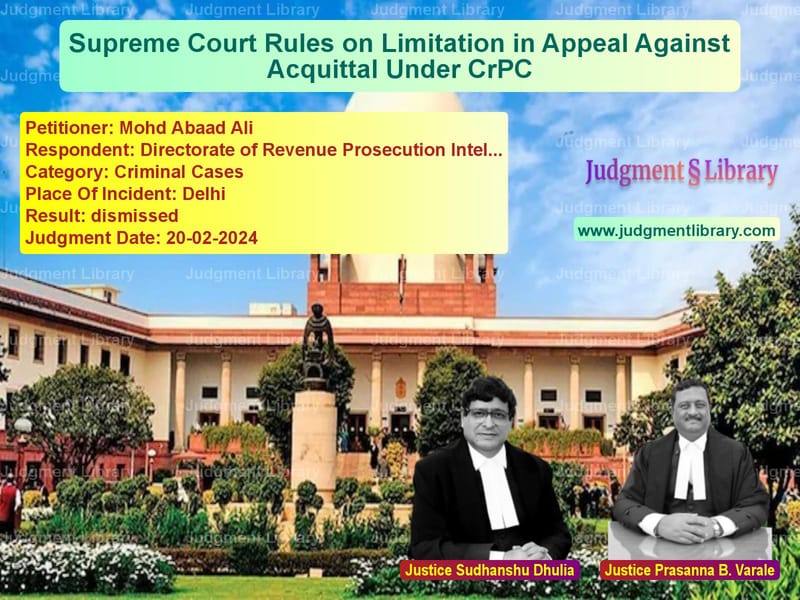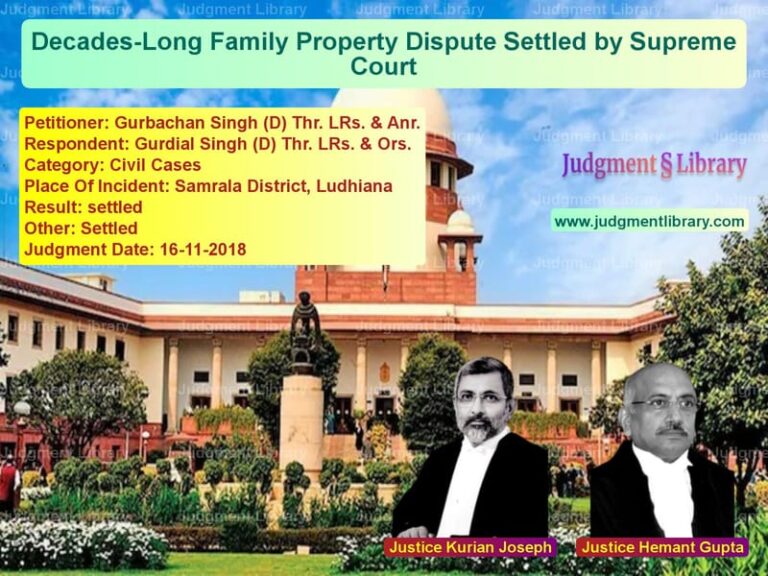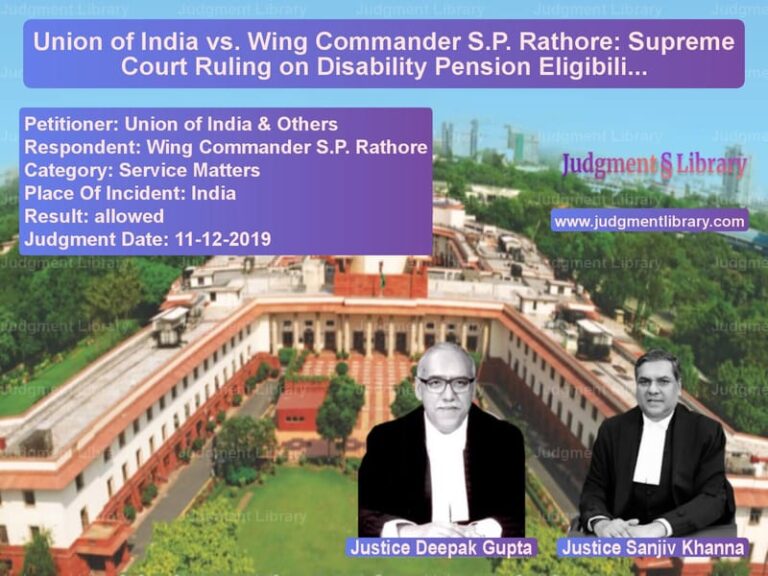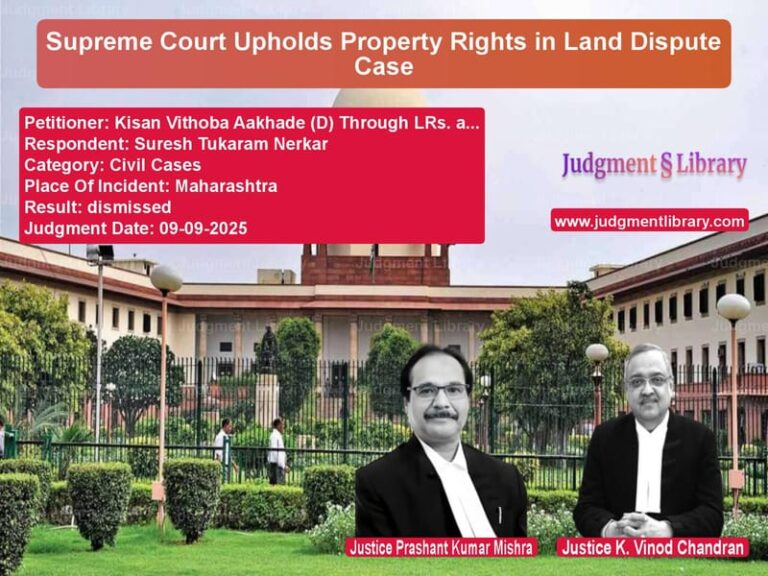Supreme Court Rules on Limitation in Appeal Against Acquittal Under CrPC
The Supreme Court of India recently delivered a significant judgment regarding the applicability of the Limitation Act, 1963, to appeals against acquittals under Section 378 of the Criminal Procedure Code (CrPC). The ruling clarifies that courts have the power to condone delays in filing appeals against acquittals, reinforcing the principle that procedural laws should be interpreted in a manner that ensures justice.
Background of the Case
The appellant, Mohd Abaad Ali, was one of the four accused in a case instituted under Section 135(1)(b) of the Customs Act, 1962. The trial court acquitted him on October 6, 2012. The Directorate of Revenue Intelligence (DRI) filed an appeal against the acquittal before the Delhi High Court on June 27, 2013, after a delay of 72 days.
Since the appeal was time-barred, the DRI moved an application for condonation of delay under Section 5 of the Limitation Act. The High Court allowed the application on May 18, 2016. The appellant then moved an application under Section 482 of the CrPC to recall the order allowing the delay, arguing that Section 5 of the Limitation Act does not apply to appeals against acquittals. The High Court dismissed the application without assigning any reasons, leading to the present appeal before the Supreme Court.
Arguments by the Appellant
The appellant’s counsel, Mr. Vijay Kumar Aggarwal, argued that:
- Section 5 of the Limitation Act does not apply to appeals against acquittals because Section 378 of the CrPC prescribes a specific period for filing such appeals.
- The judgment in Kaushalya Rani v. Gopal Singh (1964) 4 SCR 982 established that appeals against acquittals are governed exclusively by the CrPC, making the Limitation Act inapplicable.
- The High Court had no power to condone the delay because Section 378 of the CrPC is a self-contained code that does not provide for delay condonation.
Arguments by the Respondent
The DRI countered these arguments by stating that:
- Kaushalya Rani was decided under the 1898 CrPC and the 1908 Limitation Act, both of which have since been repealed.
- The Limitation Act, 1963, contains Section 29(2), which allows for the application of Section 5 in cases where special or local laws prescribe a limitation period unless expressly excluded.
- The Supreme Court, in Mangu Ram v. Municipal Corporation of Delhi (1976) 1 SCC 392, held that Section 5 applies to appeals against acquittals under the 1973 CrPC.
Supreme Court’s Analysis
The Supreme Court examined the interplay between Section 378 of the CrPC and Section 5 of the Limitation Act. The key points of the judgment include:
- Distinguishing Kaushalya Rani: The Court noted that the ruling in Kaushalya Rani was based on the old CrPC and Limitation Act, both of which have been replaced. The present CrPC and Limitation Act provide a different statutory framework.
- Applicability of Section 29(2) of the Limitation Act: The Court held that Section 29(2) of the Limitation Act applies to appeals against acquittals under Section 378 of the CrPC. This provision states that where a special law prescribes a limitation period, the provisions of the Limitation Act apply unless expressly excluded.
- Reliance on Mangu Ram Case: The Court cited Mangu Ram, which clarified that Section 5 applies to appeals against acquittals because the 1963 Limitation Act does not contain an express exclusion.
- Principle of Justice: The Court emphasized that procedural laws should be interpreted in a way that advances the cause of justice rather than obstructing it. Since no express exclusion of Section 5 exists, its application is justified.
The Supreme Court ruled:
“There is no express exclusion of Section 5 of the Limitation Act in the CrPC. The High Court was, therefore, justified in condoning the delay in filing the appeal against acquittal.”
The Court also observed:
“Procedural laws are meant to facilitate justice. A rigid interpretation of limitation provisions should not lead to injustice by barring meritorious cases.”
Final Judgment
The Supreme Court dismissed the appeal, upholding the High Court’s order allowing the condonation of delay. The Court directed the Delhi High Court to proceed with the hearing of the appeal against acquittal.
Legal Implications of the Judgment
This ruling has far-reaching implications for criminal appellate jurisprudence:
- Clarifies Limitation Law: The decision settles the long-standing debate on whether Section 5 of the Limitation Act applies to appeals against acquittals.
- Ensures Access to Justice: The ruling ensures that procedural technicalities do not hinder substantive justice.
- Precedent for Future Cases: Courts dealing with similar cases now have clear guidance that Section 5 applies unless explicitly excluded.
- Balancing Rights: The judgment strikes a balance between the rights of acquitted individuals and the prosecution’s ability to challenge potentially erroneous acquittals.
Conclusion
The Supreme Court’s decision affirms the importance of flexibility in procedural laws to ensure justice. By allowing the condonation of delay in filing appeals against acquittals, the ruling prevents the miscarriage of justice due to rigid statutory interpretation. The judgment provides a clear roadmap for future cases and reinforces the principle that courts must prioritize substantive justice over procedural technicalities.
Petitioner Name: Mohd Abaad Ali.Respondent Name: Directorate of Revenue Prosecution Intelligence.Judgment By: Justice Sudhanshu Dhulia, Justice Prasanna B. Varale.Place Of Incident: Delhi.Judgment Date: 20-02-2024.
Don’t miss out on the full details! Download the complete judgment in PDF format below and gain valuable insights instantly!
Download Judgment: mohd-abaad-ali-vs-directorate-of-reven-supreme-court-of-india-judgment-dated-20-02-2024.pdf
Directly Download Judgment: Directly download this Judgment
See all petitions in Bail and Anticipatory Bail
See all petitions in Fraud and Forgery
See all petitions in Judgment by Sudhanshu Dhulia
See all petitions in Judgment by Prasanna Bhalachandra Varale
See all petitions in dismissed
See all petitions in supreme court of India judgments February 2024
See all petitions in 2024 judgments
See all posts in Criminal Cases Category
See all allowed petitions in Criminal Cases Category
See all Dismissed petitions in Criminal Cases Category
See all partially allowed petitions in Criminal Cases Category







